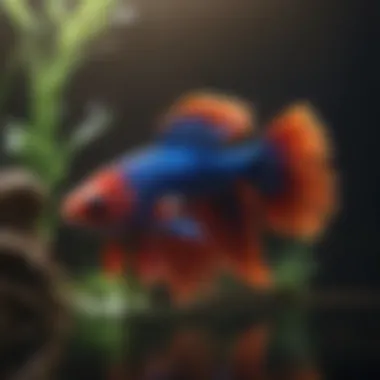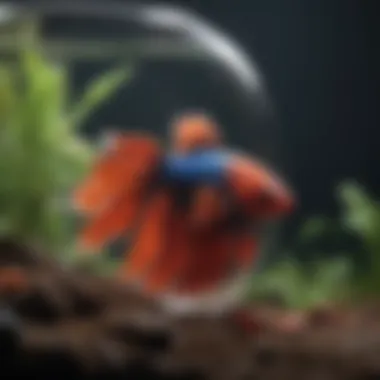Unlocking the Secrets: What to Feed Your Betta Fish for Optimal Health


Animal Species Profile
When considering the dietary requirements of Betta fish, also known as Siamese fighting fish, it's imperative to delve into their unique characteristics and natural habitat to understand their feeding needs better. Betta fish are fascinating freshwater aquarium pets renowned for their vivid colors and intriguing behaviors. Their long, flowing fins and vibrant hues make them a stunning addition to any aquarium setting. In the wild, Betta fish are native to the rice paddies, canals, and floodplains of Southeast Asia, where they navigate through slow-moving waters. These territorial fish have labyrinth organs that allow them to breathe air from the water's surface, enabling them to survive in oxygen-deprived environments. Betta fish can display aggressive behavior, particularly the males, as they are known for their flair in displaying their colorful fins as a mating or territorial signal. Understanding these physical and behavioral aspects is crucial in ensuring their well-being and selecting appropriate dietary choices.
Conservation & Wildlife Efforts
Conservation efforts for Betta fish are essential to preserve their natural habitats and protect them from endangerment. The conservation status of Betta fish varies depending on the species, with some facing threats due to habitat destruction, pollution, and illegal collection for the aquarium trade. Initiatives by conservation organizations aim to raise awareness about the importance of sustainable practices and the conservation of Betta fish and their ecosystems. Despite the challenges, there have been successful stories of Betta fish populations being restored through targeted conservation action. By supporting these conservation efforts and promoting responsible pet ownership, individuals can contribute to safeguarding the future of Betta fish and their habitats.
Animal Behavior & Psychology
The behavior and psychology of Betta fish offer a fascinating insight into their intricate communication patterns and social dynamics. Betta fish communicate through a variety of visual signals, including fin displays and body postures, to establish dominance or attract potential mates. During breeding, male Betta fish build bubble nests to shelter their eggs and actively participate in parenting duties by guarding the eggs and fry. Studies have shown that Betta fish possess cognitive abilities, such as memory retention and problem-solving skills, allowing them to adapt to changing environments and learn from past experiences. Their emotional intelligence is evident in their social interactions, where they display affiliative behaviors towards familiar tank mates and aggression towards perceived threats or competitors. Understanding these behavioral nuances can help in catering to their mental stimulation and well-being.
Unique Facts & Trivia
Dive into the realm of Betta fish and uncover surprising facts and trivia that showcase their remarkable adaptations and intriguing behaviors. Did you know that Betta fish have a labyrinth organ that enables them to breathe atmospheric air, making them capable of surviving in oxygen-deficient waters? These resilient fish can withstand harsh environmental conditions by adapting their breathing mechanism to seek oxygen from the water's surface. Additionally, Betta fish exhibit territorial behavior, creating bubble nests as part of their courtship displays and parental care. Their vibrant colors serve as a dual purpose, attracting mates and warning off potential rivals in their territory. Betta fish are also known for their unique ability to recognize their owners and display distinctive personalities, forging special bonds with their caretakers. Embrace these little-known facets of Betta fish to deepen your appreciation for these captivating aquatic creatures.
Pet Care & Tips
Providing optimal care for your Betta fish involves understanding their specific requirements and implementing best practices to ensure their health and well-being. When choosing Betta fish as pets, consider factors like tank size, water temperature, filtration, and tank mates to create a suitable environment for them to thrive. Betta fish thrive in tropical waters with stable temperatures ranging between 75°F to 80°F and require ample space to swim freely and exhibit their natural behaviors. Maintaining water quality is paramount, as Betta fish are sensitive to water parameters and can fall ill if exposed to poor water conditions. Regular water changes, proper feeding schedules, and monitoring their behavior are essential aspects of Betta fish care. By prioritizing their dietary needs, providing enriching activities, and creating a safe habitat, you can promote the longevity and happiness of your Betta fish companions.
What Can Feed My Betta Fish
Introduction
Betta fish, also known as Siamese fighting fish, are fascinating creatures that grace freshwater aquariums across the globe. This article delves into the intricate world of Betta fish nutritional needs, exploring the significance of feeding them appropriate diets to ensure their well-being and vibrancy.
Overview of Betta Fish
Betta fish, originally hailing from Southeast Asia, possess striking colors and elaborate fins that make them a standout choice for aquatic enthusiasts. Their labyrinth organ allows them to breathe air from the surface, giving them a unique advantage in surviving low-oxygen environments. Betta fish are known for their territorial behavior, often exhibiting aggression towards other fish, especially males. Understanding these traits is vital for providing them with suitable care and nourishment.
Origins and Characteristics
Originating in the rice paddies of Thailand, Betta fish have evolved to thrive in stagnant waters with low oxygen levels. Their capability to breathe atmospheric air through their labyrinth organ sets them apart from other fish species. This specialized adaptation enables Betta fish to survive in harsh conditions and adds to their allure as unconventional aquatic pets.
Typical Behavior


Betta fish are solitary creatures that engage in intricate courtship rituals and territorial displays. Males are especially known for their aggressive nature towards other male counterparts, necessitating separate tank arrangements to prevent conflicts. Understanding these behavioral patterns is crucial for creating a conducive environment for Betta fish to live harmoniously and thrive.
Importance of Proper Nutrition
A well-balanced diet plays a crucial role in maintaining the health and vitality of Betta fish. Proper nutrition not only enhances their immune system but also promotes the vibrant colors that Betta fish are renowned for. By providing them with quality food tailored to their dietary requirements, owners can ensure that their beloved aquatic companions lead thriving lives.
Impact on Health
The nutritional intake of Betta fish directly impacts their overall health and well-being. A diet rich in essential nutrients, such as proteins and vitamins, is key to supporting their immune system and keeping common illnesses at bay. By understanding the nutritional needs of Betta fish, owners can proactively safeguard their pets against potential health issues and nurture them towards longevity.
Promoting Vibrant Colors
Proper nutrition not only sustains the physical health of Betta fish but also enhances the vibrancy of their colors. Carotenoids found in certain foods can intensify the hues of Betta fish, transforming them into captivating underwater gems. By incorporating color-enhancing nutrients into their diet, owners can revel in the dazzling spectacle of their Betta fish shimmering in all their vivid splendor.
Types of Food for Betta Fish
Exploring the dietary options for Betta fish is crucial in enhancing their health and vibrancy. Understanding the various types of food available for Betta fish is essential to tailor their diet effectively. By delving into the specifics of commercial betta pellets, live foods, and frozen foods, you can provide a well-rounded meal plan for these exotic fish.
Commercial Betta Pellets
Nutritional Value
Commercial betta pellets are formulated to provide essential nutrients that support the overall health of Betta fish. These pellets are often enriched with vitamins, proteins, and minerals necessary for maintaining vibrant colors and strong immunity. One key characteristic of commercial betta pellets is their balanced nutritional composition, promoting optimal growth and vitality among Betta fish. Despite their convenience, some drawbacks of these pellets include the possibility of overfeeding and the potential lack of variety in diet.
Feeding Guidelines
Feeding Betta fish with commercial betta pellets should follow specific guidelines to ensure proper nutrition and prevent overconsumption. These guidelines typically include feeding small portions 2-3 times a day, depending on the fish's size and appetite. The key characteristic of these feeding guidelines lies in promoting portion control and preventing excess food from contaminating the water. While convenient and nutrient-dense, over-reliance on pellets may lead to a lack of dietary diversity and potential nutrient deficiencies.
Live Foods
Best Options
Live foods such as bloodworms and brine shrimp offer Betta fish a varied and natural diet, mimicking their eating habits in the wild. These live options are rich in protein and essential nutrients, promoting the fish's overall well-being and vitality. The key characteristic of live foods is their high nutritional value and the stimulation they provide to Betta fish during feeding time. However, feeding live foods requires caution to prevent introducing harmful parasites or diseases into the aquarium, affecting the fish's health.
Precautions


While live foods offer numerous benefits, they also come with potential risks that need consideration. It is crucial to ensure the quality and hygiene of the live foods offered to Betta fish to prevent contamination and health issues. Additionally, moderation is key when feeding live foods to Betta fish, as excessive consumption can lead to digestive problems and water quality issues in the aquarium.
Frozen Foods
Variety Available
Frozen foods provide Betta fish with a diverse menu, ranging from bloodworms to daphnia and brine shrimp. This variety offers different nutritional benefits and textures, keeping the fish engaged and satisfied during feeding sessions. The key characteristic of frozen foods is their convenience and extended shelf life compared to live foods, ensuring a readily available food source for Betta fish. However, proper storage and thawing techniques are essential to maintain the nutritional value of frozen foods and prevent bacterial contamination in the aquarium.
Storage Tips
Storing frozen foods correctly is vital to preserve their freshness and nutritional quality. It is recommended to keep frozen foods in a freezer at a consistent temperature to prevent spoilage and loss of nutrients. Thawing frozen foods in a small container of aquarium water before feeding helps maintain the food's integrity and prevents temperature shock to the fish. By following proper storage tips, you can ensure that Betta fish receive the maximum nutritional benefits from frozen foods without compromising their health or well-being.
Frequency and Portion Control
Frequency and portion control play a pivotal role in maintaining the optimal health and well-being of Betta fish. Understanding the importance of regulating how often and how much you feed your Betta is crucial for preventing obesity, digestive issues, and ensure a balanced diet. Proper frequency and portion control can also enhance the vibrancy of their colors and promote longevity. By following a structured feeding schedule and monitoring portion sizes, you can significantly reduce the risk of overfeeding and related health complications.
Ideal Feeding Schedule
Daily Requirements
Daily requirements are a fundamental aspect of a Betta fish's diet. Establishing a consistent feeding routine tailored to meet the specific needs of Betta fish is essential for their growth and vitality. Daily feeding ensures that Betta receive the necessary nutrients to thrive and maintain optimal health. It allows for the customization of their diet based on individual requirements and helps in sustaining their energy levels throughout the day. However, proper portion control is key to prevent overfeeding and maintain a healthy balance in their diet. Additionally, adhering to daily feeding guidelines helps in observing their feeding behavior and adjusting the diet accordingly to ensure they are receiving adequate nutrition.
Avoid Overfeeding
Overfeeding poses a significant risk to the well-being of Betta fish. It can lead to obesity, bloating, and digestive issues, ultimately affecting their overall health. Avoiding overfeeding requires a keen understanding of their dietary needs and portion sizes. By controlling the amount of food offered and observing their feeding habits, you can prevent overconsumption and maintain a healthy weight for your Betta. Overfeeding can also impact water quality in the aquarium, leading to increased waste and potential health hazards for the fish. Therefore, monitoring their feeding habits and adjusting portion sizes accordingly is essential in preventing overfeeding.
Portion Size Considerations
Tailoring to Individual Betta
Tailoring portion sizes to suit the individual needs of Betta fish is crucial for their health and well-being. Each Betta may have unique dietary requirements based on factors like age, size, and activity level. Tailoring portion sizes ensures that each fish receives adequate nutrition without the risk of under or overfeeding. By observing their growth and energy levels, you can adjust portion sizes accordingly to promote their overall health and vitality. Tailoring feeding portions also allows for a more personalized approach to their diet, catering to any specific dietary preferences or restrictions they may have.
Monitoring Dietary Intake
Monitoring the dietary intake of Betta fish is essential to track their nutritional needs and prevent potential health issues. By observing their feeding behavior and adjusting portion sizes as needed, you can ensure they are receiving a balanced diet. Monitoring dietary intake also involves keeping track of the types of food offered and their response to different meals. This helps in identifying any preferences or aversions they may have towards certain foods and allows for the modification of their diet accordingly. Maintaining a close eye on their dietary intake enables you to address any nutritional deficiencies promptly and uphold their overall well-being.


Supplementary Feeding Tips
In the realm of caring for Betta fish, focusing on Supplementary Feeding Tips holds immense significance. By delving into this aspect, one can provide essential nutrients that may not be present in traditional Betta fish diets. These tips act as a catalyst in ensuring the overall health and well-being of your aquatic companions. Noteworthy elements within this sphere include identifying vegetable options to offer a well-rounded diet for Betta fish.
Vegetable Options
Suitable Choices
When pondering upon Suitable Choices of vegetables for Betta fish, aspects such as nutrient content and ease of digestion come to the forefront. Leafy greens like spinach and kale prove to be invaluable due to their high vitamin and fiber content, promoting digestive health and overall vitality. They stand out as popular selections among Betta fish enthusiasts for their enriching properties. Despite their advantages, it's vital to consider the appropriate portion sizes to prevent overconsumption that could lead to digestive issues.
Preparation Techniques
In the domain of Preparation Techniques for vegetables, factors like proper washing and cutting methods play a pivotal role in maintaining freshness and nutritional value. Lightly blanching vegetables such as zucchinis and cucumbers can aid in breaking down tough cellulose, enhancing digestibility for Betta fish. This technique not only ensures food safety by eliminating harmful bacteria but also softens the texture for easy consumption. However, excessive cooking may deplete essential nutrients, emphasizing the need for moderation in preparation methods.
Feeding Frequency
Balancing Diet
When addressing the necessity of Balancing Diet for Betta fish, a crucial factor is harmonizing protein-rich foods with vegetable options to offer a diverse nutrient profile. This approach not only prevents dietary imbalances but also supports optimal growth and vibrant coloration in Betta fish. By incorporating vegetables in their diet, Betta fish receive essential vitamins and minerals that contribute to overall well-being and longevity.
Preventing Malnutrition
The significance of Preventing Malnutrition in Betta fish revolves around ensuring a well-rounded diet that meets their nutritional requirements. Nutrient deficiencies can lead to various health issues, impacting their immune system and overall vitality. By actively monitoring their diet and adjusting food portions accordingly, one can safeguard Betta fish from malnutrition-related complications. This proactive approach aids in sustaining their health and maximizing their quality of life.
Conclusion
A crucial aspect in the care of Betta fish is ensuring a balanced diet. By maintaining a proper feeding regimen, you promote the health, vibrancy, and longevity of your aquatic companions. Being mindful of the nutritional needs of Betta fish can prevent common health issues and foster their overall well-being. This section encapsulates the essence of providing a well-rounded diet for your Betta fish.
Ensuring a Balanced Diet
Key Takeaways
Ensuring a balanced diet for Betta fish involves offering a variety of foods to meet their nutritional requirements comprehensively. Key takeaways include the significance of incorporating high-quality protein sources, such as Betta pellets or live foods, to support their energy levels and growth. Additionally, a mix of vegetables can contribute essential vitamins and fiber to their diet. Understanding the dietary needs of Betta fish is paramount in sustaining their health and vitality.
Continuous Observation
Continuous observation of your Betta fish is vital in ensuring their dietary needs are met. By monitoring their eating habits, you can adjust the feeding schedule and portion sizes accordingly. Recognizing any changes in behavior or appearance can indicate potential health concerns, prompting necessary adjustments to their diet. This ongoing observation allows you to fine-tune their nutrition for optimal well-being.
Final Thoughts
Nutrition serves as the foundation of Betta fish care, influencing their growth, coloration, and overall health. By prioritizing a balanced diet, you lay the groundwork for the well-being of your aquatic pets. Understanding the role of nutrition as a fundamental aspect of Betta fish care empowers you to provide them with the best possible care and environment. This holistic approach enhances the quality of life for your Betta fish, reflecting your commitment to their welfare.







